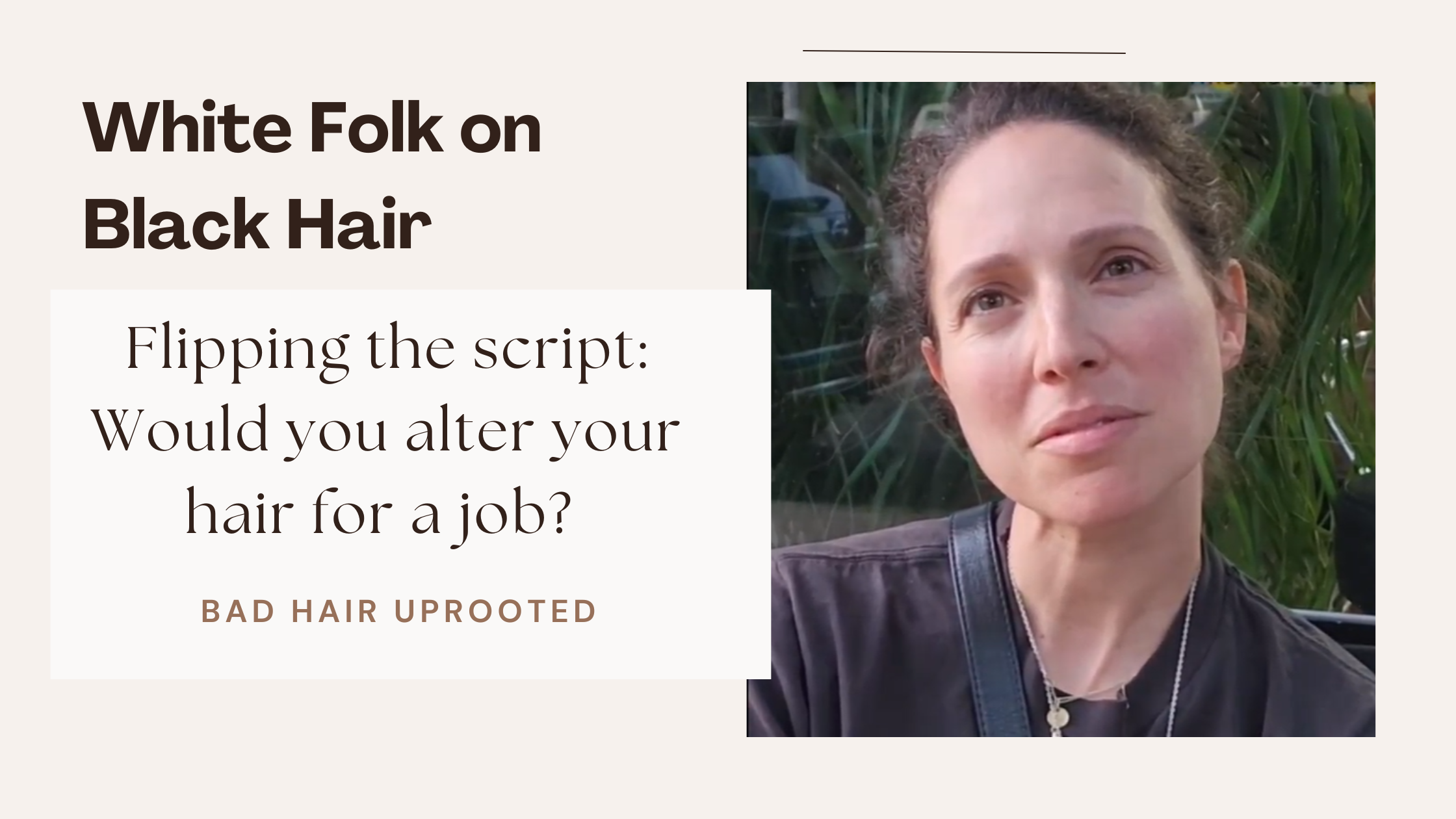You're sitting in a job interview, confident in your skills and experience, when the conversation takes an unexpected turn. The interviewer compliments your resume but tells you your hair doesn't align with the company's image.
This isn't a situation many non-Black people face, but for countless Black individuals, it’s an all-too-familiar reality. Hairstyles like braids, afros, and locs are often seen as unprofessional. What if the expectation to change your hair was suddenly placed on everyone? How would the conversation shift then?
This question was at the forefront of my mind as I walked through my neighborhood in Bed-Stuy, Brooklyn: Would you change your hair for a job? I wanted to explore how non-Black individuals would react when confronted with a demand that Black women often face, yet rarely applies to others.
Eager to hear different perspectives, I spoke with non-Black individuals who were open to discussing Black hair and asked them five key questions:
- Can you name a few Black hairstyles?
- Are these styles accepted in your workplace?
- Would you change your hair for a job?
- Why do you think such expectations exist for Black people?
- How would you feel if your hair had to meet similar standards?
Interview Transcript
Interviewee: You’ll be filming this?
Mireille: Yes, if you don't mind.
Mireille: So, um, what do you know about black hair? Like, can you name a few black hairstyles?
Interviewee: No, not really.
Interviewee: I guess cornrows, braids, I mean twists, but this is just like what my girlfriend used to do to my hair to match hers. I don't know if it had a name.
Mireille: Okay, that's good.
Mireille: Um, cornrows. Not many people know that name.
Interviewee: Oh, really?
Mireille: Yeah, that's a good one. Okay, so then, um, how often do you wash your hair or how often do you comb your hair?
Interviewee: My hair is really curly and it's curly from the root and so... Sorry, I'm just choking on something. And so I wash my hair like maybe like every five to seven days because it doesn't produce a lot of oil.
Mireille: Okay.
Interviewee: That's when I'm leaving it curly, otherwise I'll straighten it and then probably the same amount, five to seven.
Mireille: So you wouldn't, like, if I don't comb my hair, if I would tell you that I never comb my hair, would that surprise you?
Interviewee: No, it wouldn't.
Mireille: Okay.
Interviewee: And also because when my hair is curly, I don't comb it. Yeah. That's why it'll last the five, seven, it looks awful. But then, yeah.
Mireille: Yeah, okay, we know the curly hair. Okay, we have that.
Interviewee: We have the curly hair connection.
Mireille: If you would like, apply for a job and the employer told you like, yes you can work here, I think you have the skills, you can get a job, but you need to either wear an afro, cornrows or dreadlocks. What would you say?
Interviewee: So it's a requirement of the job that you have to wear your hair a specific way?
Mireille: Yes. And you have to get a perm to make it really curly? Or you have to do stuff so that it can get dreadlocks? Yes. Or you have to braid it?
Interviewee: Oh, dreadlocks is another hairstyle. Okay, I would say that seems a little bit off. I don't think a place of business should require you to have to do anything to your physical appearance in order to keep the job. Unless somehow that's required for the job, in order for you to do the job. Which I'm falling short in trying to think of why it would be required.
Mireille: No, the reason I actually ask is because nobody's aware of it, but that's basically what they require Black people to do, because our hair needs to be straight or our hair needs to be in a certain way, because we are the only people on the planet Earth who don't have the human right to wear our God-given tresses naturally. Great, so there's, like, employers that require you have to straighten your hair? Yes, because we can't... You can't... Some employers, they don't accept dreadlocks, they don't accept braids, they don't... There was a whole... The last... It was... It required, like, I think in the 80s was the first, like, lawsuit about it that you couldn't wear braids, but our hair is naturally, like, even your hair is naturally, but our hair is kinky, so we can't, like... We have to use chemicals to straighten our hair, and people don't realize that, but they want us to wear hair... Like I said, like, you know what it would take.
This conversation is just a small glimpse into a much larger issue that Black individuals, particularly women, face daily when it comes to their natural hair. These interactions open up dialogues that challenge us to rethink and confront the biases surrounding something as personal and natural as hair.
What Do You Think?
If you enjoyed this interview, I invite you to join the conversation at the BAD Hair Uprooted Exhibition on October 10th at the Billy Holiday Theatre. If you like to support please download my book.





